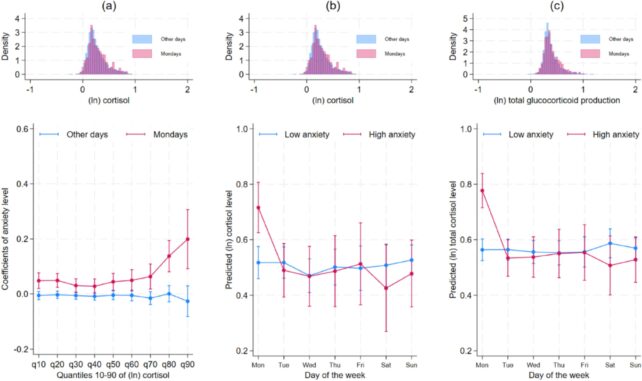Don't like Mondays? You might be at higher risk of stress-related health problems, including cardiovascular disease.
Modern society has built up Mondays to be the least-liked day of the week. We've just come back from a relaxing weekend and now have to face all the responsibilities we've been ignoring, knowing there's the longest possible time before another weekend.
Not only did a recent study by researchers from the University of Hong Kong (HKU) identify a link between anxiety towards the first day of the working week and elevated levels of a stress hormone, the connection persisted even after retirement.
While correlations do not equal causation, a jump in the stress signal cortisol is closely connected with risk of illnesses. Which could explain why a 2005 meta-analysis found that there's anywhere up to a 19 percent increase in cardiovascular events on Mondays compared to other days of the week.
Related: Scientists Confirm The Worst Day of The Week For Severe Heart Attacks
In this latest study, researchers investigated a possible link between feelings of anxiety towards Mondays and physical health.
The team examined 3,511 adults aged 50 years and over, taking part in the English Longitudinal Study of Aging (ELSA). Participants reported their levels of anxiety on different days of the week, while hair samples were also taken and analyzed for levels of the stress hormone cortisol.
The study found that people who reported feeling particularly anxious on Mondays had cortisol levels around 23 percent higher than those who felt anxious on other days.

This association seems to suggest that Monday anxiety affects the hypothalamic-pituitary-adrenal (HPA) axis, the body's main stress management system. But chronic stress can overstimulate the HPA axis and lead to immune system issues, metabolic diseases like cancer or diabetes, and cardiovascular disease.
This could be the biological mechanism behind the earlier findings of increases in cardiovascular events on Mondays, suggests the team on the new study.
It might seem like an obvious work-related hazard, but strangely the study found that even retirees still felt higher stress levels on Mondays, along with the negative health effects.
"Mondays act as a cultural 'stress amplifier'," says Tarani Chandola, sociologist at HKU. "For some older adults, the week's transition triggers a biological cascade that lingers for months. This isn't about work – it's about how deeply ingrained Mondays are in our stress physiology, even after careers end."
Maybe Garfield was onto something.
The research was published in the Journal of Affective Disorders.
